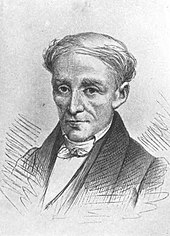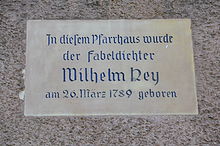Wilhelm Hey (poet)

Johann Wilhelm Hey (born March 26, 1789 in Leina , † May 19, 1854 in Ichtershausen ) was a German pastor, song and fable poet .
Life
Wilhelm Hey was born as a pastor's son in the rectory in Leina and grew up with his brother Karl after the death of his parents. After attending the Illustre grammar school in Gotha from 1802 to 1808, he studied theology in Jena and Göttingen .
From 1811 to 1814 he worked as a private tutor in Appeltern near Nijmegen in the Netherlands. He then worked as a teacher in a boarding school in Gotha before he became a pastor in Töttelstädt near Erfurt in 1818 .
In 1827 Hey was appointed court preacher in Gotha. There he was friends with the publisher Friedrich Perthes . He was then transferred to Ichtershausen near Erfurt as pastor, superintendent and district school inspector in 1832 . There he opposed theological rationalism , worked for a living Christianity and was committed to social-charitable measures, including a. an auxiliary fund for craftsmen, a training school he supervised for craftsmen's apprentices and a “children's home” that took care of their little ones from working mothers. In 1847 the Theological Faculty of Heidelberg University honored him with an honorary doctorate, as "a man highly deserved for all of Germany's youth". Until his death, Hey remained true to his convictions and his commitment to a people-friendly theology.
Hey married Auguste Grosch in 1810, who died in 1827. In 1832 he married Luise von Axen. In 1838 the son Wilhelm was born.
Hey lived in Gotha in the "Perthesschen Haus" in Gotthardstrasse. 4, where a plaque commemorates his work.
In Töttelstädt a memorial plaque on the former rectory, Ludwig-Böhner-Platz 4, reminds of his life and work, and a street has been named after him since 1998.
Act
Wilhelm Hey became famous as a fable poet thanks to his Fifty Fables for Children, published anonymously in 1833, and the sequel Still fifty fables for children (1837), each with illustrations by Otto Speckter . Since the first editions appeared without naming Wilhelm Hey as the author, the work was initially known as Otto Speckter's Fablebook in the 19th century . In the preface to the Fifty Fables , the publisher makes it clear: “Our Otto Speckter's express wish in Hamburg still demands the declaration that only the pictures, not the words in the little book are from him.” Individual fables: Wanderer and Lerche , The raven , the poodle . His fables have been translated into numerous languages, including Mary Howitt's translation into English known as Otto Speckter's Fable Book .
The poet Wilhelm Hey also emerged as a translator. In 1830 he translated from the English The Course of Time by Robert Pollok (1798-1827).
In addition, he published a selection of sermons (1829), stories from the life of Jesus for the boys (1838) and The Child from the Cradle to School (1850).
His song Do you know how many little stars stand has become one of the most popular children's and Gutenachtlieder to this day and is in the Evangelical Hymnal (No. 511). The lyrics of the Christmas carols All Years Again and The Most Beautiful Time, The Favorite Time come from Heys pen . Also well known were the morning prayer How happy I woke up and the songs Birds in the high tree and Who only thought up the flowers, as well as the spiritual folk song From far off heaven, where the angels are .
circle of friends
In 2008, a Wilhelm Hey Circle of Friends was founded in Hey's birthplace in Leina . Its members come from the “Hey communities” in which he was active, but also from the rest of Thuringia and Germany.
Works
- Poems. Berlin 1816.
- Sermons (selection). I, 1829 ( digitized version ).
- Sermons (selection). II, 1832.
- Fifty fables for children. Drawn in pictures by Otto Speckter. Along with a serious attachment. Perthes, Hamburg 1833 ( digibib.tu-bs.de digitized version of the Westermann edition, Braunschweig 1920 in the digital library of the Technical University of Braunschweig )
- Fifty more fables for children. Drawn in pictures by Otto Speckter. Along with a serious attachment. Perthes, Hamburg, 1837 ( urn : nbn: de: hbz: 061: 1-117586 , digitized version of the new edition Perthes, Gotha 1877 at the University and State Library Düsseldorf ).
- Stories from the life of Jesus for the youth. Hamburg, 1838 ( digitized version )
- Pictures and rhymes, rhymes and pictures for children. (Drawings by Ludwig Richter ), Dresden, 1859.
literature
- August Beck: Hey, Johann Wilhelm . In: Allgemeine Deutsche Biographie (ADB). Volume 12, Duncker & Humblot, Leipzig 1880, p. 344 f.
- J. Bonnet: The fable poet Wilhelm Hey, a friend of our children. 1885.
- Theodor Hansen : Wilhelm Hey, shown from his own letters and communications from his friends. 1886.
- A. Bütow: Wilhelm Hey, a picture of his life and poetry. 1889.
- N. Knauf: The fable poet Wilhelm Hey and its significance for the school. In: Teacher Examination and Information Work. Issue 20. Minden 1889, pp. 3-38; 3rd improved edition 1905.
- Ludwig Göhring: The beginnings of German youth literature in the 18th century. A contribution to the history of German youth literature, with an appendix: Three children's poets, Hey, Hoffmann von Fallersleben, Güll. F. Korn, Nuremberg 1904, pp. 93-103.
- Paul Stein: The singer of Wandersmann and Lerche. Superintendent D. Wilhelm Hey. A picture of life. Zillesen, Berlin 1904 ( digitized version ).
- Adalbert Elschenbroich: Hey, Wilhelm. In: New German Biography (NDB). Volume 9, Duncker & Humblot, Berlin 1972, ISBN 3-428-00190-7 , p. 62 f. ( Digitized version ).
- Margarethe Dierks: Hey, Johann Wilhelm. In: Lexicon of children's and youth literature. Volume 1. Beltz, Weinheim / Basel 1975, ISBN 3-407-56511-9 , pp. 545-546.
- Walter Scherf : Afterword. In: Fifty Fables for Children. Reprint of the first edition from 1833 (= The bibliophile paperbacks. 28). Harenberg Kommunikation, Dortmund 1978, ISBN 3-921846-28-5 , pp. [Appendix] 1-18.
- Friedrich Wilhelm Bautz : Hey, Wilhelm. In: Biographisch-Bibliographisches Kirchenlexikon (BBKL). Volume 2, Bautz, Hamm 1990, ISBN 3-88309-032-8 , Sp. 803-804.
- Bettina Hurrelmann, Ulrich Kreidt: Wilhelm Hey and Otto Speckter: Fifty fables for children, another fifty fables for children (1833/37). In: Otto Brunken, Bettina Hurrelmann, Klaus-Ulrich Pech (eds.): Handbook for children's and youth literature. [Volume 4:] From 1800 to 1850. Metzler, Stuttgart 1998, ISBN 3-476-00768-5 , Sp. 918-938.
- Thomas Schlage: Hey, Wilhelm. In: Wolfgang Herbst (Ed. :) Who is who in the hymnal? Vandenhoeck & Ruprecht, Göttingen 2001, ISBN 3-525-50323-7 , p. 152 f. ( limited preview in Google Book search).
Web links
- Literature by and about Wilhelm Hey in the catalog of the German National Library
- Works by and about Wilhelm Hey in the German Digital Library
- Works by Wilhelm Hey in the Gutenberg-DE project
- Wilhelm Hey in Töttelstädt
- Friends of Wilhelm Hey
Individual evidence
- ↑ August Beck: Hey, Johann Wilhelm . In: Allgemeine Deutsche Biographie (ADB). Volume 12, Duncker & Humblot, Leipzig 1880, p. 344 f.
- ↑ Fifty more fables for children. Perthes, Gotha 1850 ( full text in the Gutenberg-DE project )
- ↑ Bernhard Leube: 511 - Do you know how many little stars there are . In: Gerhard Hahn , Jürgen Henkys (Hrsg.): Liederkunde zum Evangelisches Gesangbuch . No. 9 . Vandenhoeck & Ruprecht, Göttingen 2004, ISBN 3-525-50332-6 , pp. 52–56 ( limited preview in Google Book Search).
| personal data | |
|---|---|
| SURNAME | Hey, Wilhelm |
| ALTERNATIVE NAMES | Hey, Johann Wilhelm (full name) |
| BRIEF DESCRIPTION | German pastor, song and fable poet |
| DATE OF BIRTH | March 26, 1789 |
| PLACE OF BIRTH | Leina |
| DATE OF DEATH | May 19, 1854 |
| Place of death | Ichtershausen , Germany |



